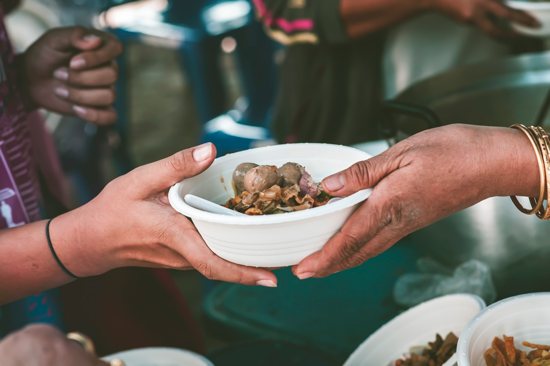
When I was living in Rome, I got to know the Little Sisters of the Lamb. They are a mendicant order, literally begging for their bread, for their means of life. These were spectacularly beautiful women with deep spirits, and so free.
In their presence, I often thought, “If you want to know true freedom, become a beggar, own nothing, have nothing, need everything — food, water, shelter. That kind of complete dependence is truly freeing.” I could see it in them, a detachment and fearless vulnerability that I came to admire.
But I’ll be honest, their lifestyle made me uncomfortable. They slept on the floor; they didn’t use deodorant or lip balm or daily niceties like that. They truly lived in communion with the poor, right down to how often they bathed and the way they fed themselves. They would approach strangers on the street and say, “We’re hungry, would you feed us?”
Why? What’s the point of a mendicant order? An order that literally begs for their bread? Aren’t there enough impoverished people in the world as it is? Why would they deliberately choose a mendicant life?
The sisters relayed a story of how, one day, they approached a woman who was clearly a prostitute, barely making a living herself, and asked if she could give them something to eat. The woman was at first taken aback by their request, but on realizing they were serious, she quickly took them to a local shop for sandwiches and coffee. The dignity they extended to her was not lost on the woman. This opened up conversation and connection on such a human and honest level, that she was deeply moved.
Mendicants present an opportunity and challenge the world clearly needs — they present us with the opportunity to give. By living in the position of the beggar, they humble themselves before the whole world. They live out that part of Christ’s life that was a needy life, first as a vulnerable child completely dependent on his parents, and later, in his public ministry as an itinerant preacher fed in the homes of Zacchaeus and others. St. John Paul the Great says that suffering unleashes love. You could argue that poverty serves us similarly; it unleashes generosity. Choosing poverty, the mendicant orders present opportunities for others who might not ordinarily be generous, or who might not ordinarily be confronted with poverty.
The Little Sisters of the Lamb’s rule reads, in part: “Following Jesus poor and crucified … incessantly praying the Name of Jesus, and seeking out after the lost sheep who have wandered furthest away, they go from door to door begging their daily bread. Witnesses of God’s mendicant love … The Little Sisters announce the Gospel to the poor, so that all, the rich and the poor alike, may be evangelized.”
The world doesn’t like beggars. The world judges the beggar harshly. So not only do mendicants take on poverty, like Christ, they take on the world’s harsh and constant judgment.
But I find the mendicants present another challenge: to ask, when I come to the Eucharist, am I in need? Am I willing to be needy? Am I willing to be a beggar before Jesus? To acknowledge my utter dependence upon his grace and mercy?
Lord, I fight my dependence at times, ashamed or embarrassed by my constant need for your grace. Today, I beg you for the grace to be a beggar before you, so that as I approach you in the Blessed Sacrament, I remember you are the answer to every need and the source of all generosity. Amen.
Stanchina is the award-winning author of more than a dozen books. She travels to speak and lead retreats throughout the US. Find her schedule at LizK.org. Follow her on Instagram at LizKToday.




